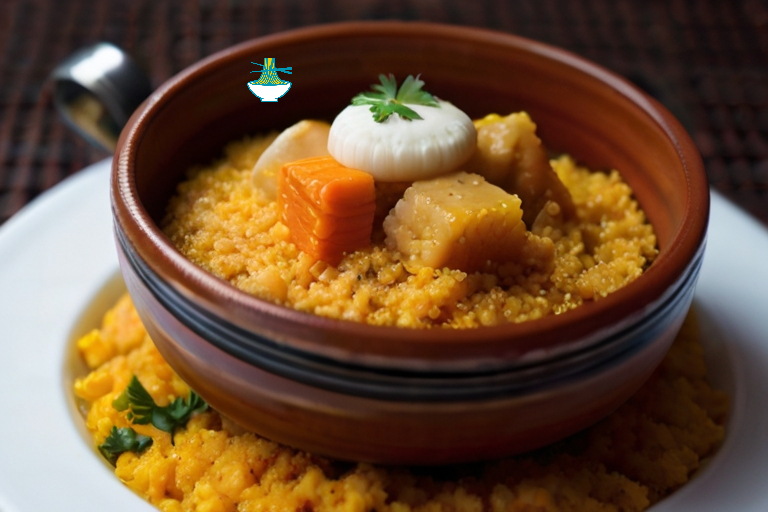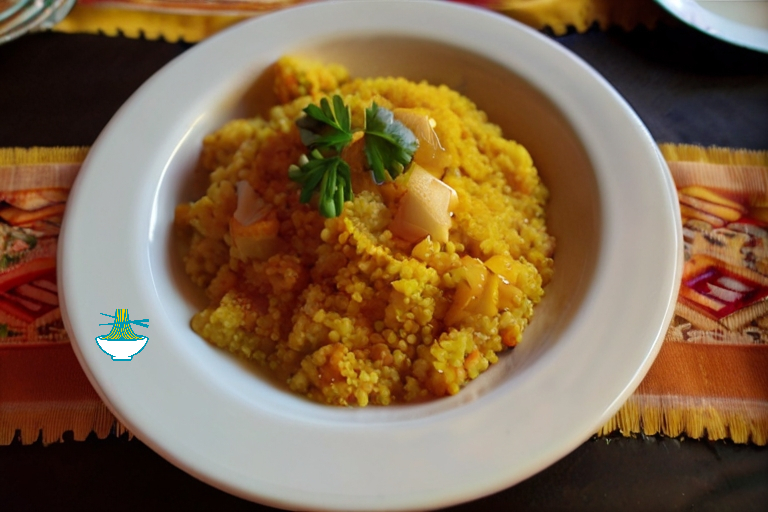Embark on a culinary adventure with our Chad Couscous de Shari recipe, a delightful fusion of flavors from Chad, a country rich in cultural diversity and culinary heritage. This vibrant dish showcases the essence of Chadian cuisine, combining aromatic spices, hearty vegetables, and tender couscous grains to create a truly satisfying meal. Whether you're a seasoned chef or an adventurous home cook, this recipe promises to tantalize your taste buds and transport you to the enchanting landscapes of Chad. Get ready to savor a symphony of flavors in every bite as we delve into the art of preparing Chad Couscous de Shari.
Ingredients:
For the Millet Couscous:
- 2 cups millet grains
- 3 cups water
- Salt to taste
For the Sauce or Stew:
- 2 tablespoons oil (palm oil for authenticity, or substitute with vegetable oil)
- 1 onion, finely chopped
- 2 tomatoes, diced
- 2 cloves garlic, minced
- 1 teaspoon ground ginger
- 1 teaspoon ground coriander
- 1 teaspoon ground cumin
- Salt and pepper to taste
- Optional: vegetables such as carrots, potatoes, bell peppers, or leafy greens
- Protein of choice (chicken, beef, lamb, or beans for a vegetarian option)
- 4 cups vegetable or chicken broth

Instructions:
Prepare the Millet Couscous:
1- Rinse the millet grains thoroughly under cold water.
2- In a large pot, bring water to a boil.
3- Add salt to taste.
4- Stir in the rinsed millet grains.
5- Reduce the heat to low, cover the pot, and simmer for 20-25 minutes, or until the millet is tender and has absorbed all the water.
6- Fluff the millet couscous with a fork and set aside.
Prepare the Sauce or Stew:
1- In a separate large saucepan or Dutch oven, heat the oil over medium heat.
2- Add the chopped onion and sauté until translucent.
3- Stir in the minced garlic and cook for another minute.
4- Add the diced tomatoes and cook until they start to break down and release their juices.
5- Sprinkle in the ground ginger, coriander, and cumin, stirring well to combine.
6- If using, add your choice of vegetables and protein to the saucepan.
7- Pour in the vegetable or chicken broth, ensuring that the ingredients are submerged.
8- Season with salt and pepper to taste.
9- Bring the mixture to a simmer and let it cook for 20-25 minutes, or until the vegetables are tender and the flavors have melded together.
Serve:
1- Spoon the cooked millet couscous onto serving plates or bowls.
2- Ladle the sauce or stew generously over the couscous.
3- Garnish with fresh herbs or chopped green onions, if desired.
4- Serve hot and enjoy the vibrant flavors of Chad Couscous de Shari!
This Chad Couscous de Shari recipe offers a delightful harmony of textures and tastes, making it a standout dish for any occasion. Revel in the warmth and hospitality of Chadian cuisine right in your own home. Bon appétit!
Nutritional Values:
Here's an approximate nutritional breakdown for the ingredients used in the Chad Couscous de Shari recipe:
Millet grains (2 cups):
- Calories: 756 kcal
- Carbohydrates: 158 g
- Protein: 22 g
- Fat: 6 g
- Fiber: 16 g
benefits:
- Excellent source of complex carbohydrates, providing sustained energy.
- Rich in dietary fiber, promoting digestive health and aiding in weight management.
- Contains essential minerals such as magnesium, phosphorus, and manganese, supporting bone health and enzyme function.
- Good source of B vitamins, contributing to energy metabolism and nervous system function.
Water (3 cups): No significant nutritional value.
benefits:
- Essential for hydration, helping to maintain bodily functions and regulate body temperature.
- Supports digestion by aiding in the breakdown and absorption of nutrients.
- Promotes healthy skin, hair, and overall well-being.
Salt: No significant nutritional value.
benefits:
- Balances electrolytes and maintains fluid balance in the body.
- Enhances flavor in dishes when used in moderation.
- Provides essential sodium and chloride ions necessary for nerve function and muscle contraction.
Oil (2 tablespoons):
- Calories: 240 kcal
- Fat: 28 g
- Saturated Fat: 2 g
- Monounsaturated Fat: 18 g
- Polyunsaturated Fat: 7 g
- No significant carbohydrates or protein
benefits:
- Source of healthy fats, including monounsaturated and polyunsaturated fats, which support heart health.
- Provides fat-soluble vitamins such as vitamin E, an antioxidant that protects cells from damage.
- Adds richness and mouthfeel to dishes while enhancing flavor.
Onion (1 medium):
- Calories: 44 kcal
- Carbohydrates: 10 g
- Protein: 1 g
- Fat: 0 g
- Fiber: 2 g
benefits:
- Rich in antioxidants, particularly flavonoids and quercetin, which may help reduce inflammation and lower the risk of chronic diseases.
- Contains prebiotic fibers that promote gut health and support the growth of beneficial bacteria.
- Adds flavor and aroma to dishes while providing essential nutrients such as vitamin C and potassium.
Tomatoes (2 medium):
- Calories: 44 kcal
- Carbohydrates: 10 g
- Protein: 2 g
- Fat: 0 g
- Fiber: 4 g
benefits:
- Excellent source of vitamin C, an antioxidant that supports immune function and collagen production.
- Rich in lycopene, a powerful antioxidant associated with reduced risk of certain cancers and heart disease.
- Provides vitamins A and K, as well as potassium and folate, contributing to overall health and well-being.
Garlic (2 cloves):
- Calories: 8 kcal
- Carbohydrates: 2 g
- Protein: 0 g
- Fat: 0 g
- Fiber: 0 g
benefits:
- Contains sulfur compounds with potential health benefits, including immune support and cardiovascular protection.
- Exhibits antimicrobial properties, helping to fight infections and promote oral health.
- May have anti-inflammatory effects and contribute to improved blood circulation and cholesterol levels.
Ground ginger (1 teaspoon):
- Calories: 6 kcal
- Carbohydrates: 1 g
- Protein: 0 g
- Fat: 0 g
- Fiber: 0 g
benefits:
- Known for its anti-inflammatory properties, ginger may help alleviate muscle pain and reduce symptoms of osteoarthritis.
- Supports digestive health by promoting gastric motility and relieving nausea and indigestion.
- Contains antioxidants that protect against oxidative stress and may lower the risk of chronic diseases.
Ground coriander (1 teaspoon):
- Calories: 5 kcal
- Carbohydrates: 1 g
- Protein: 0 g
- Fat: 0 g
- Fiber: 0 g
benefits:
- Rich in antioxidants, coriander may help reduce inflammation and oxidative stress in the body.
- Contains antimicrobial compounds that may help combat foodborne pathogens and promote gut health.
- Adds a unique flavor profile to dishes while contributing to overall health and well-being.
Ground cumin (1 teaspoon):
- Calories: 8 kcal
- Carbohydrates: 1 g
- Protein: 0 g
- Fat: 0 g
- Fiber: 0 g
benefits:
- Source of iron, a mineral essential for oxygen transport in the blood and energy metabolism.
- Contains antioxidants such as flavonoids and phenolic compounds, which may help reduce inflammation and protect against chronic diseases.
- Adds depth of flavor and warmth to dishes, enhancing their aroma and taste.
Optional vegetables (carrots, potatoes, bell peppers, leafy greens): Nutritional values vary based on the specific vegetables used.
benefits:
- Provide essential vitamins, minerals, and dietary fiber necessary for overall health and well-being.
- Contribute to a colorful and diverse diet, offering a wide range of nutrients and phytonutrients.
- Support various bodily functions, including immune function, digestion, and cellular repair.
Protein of choice (chicken, beef, lamb, beans):
- Nutritional values vary significantly based on the type and portion size of the protein chosen.
benefits:
- Essential for muscle repair and growth, providing amino acids necessary for protein synthesis.
- Supports immune function, hormone production, and enzyme activity throughout the body.
- Helps regulate appetite and promote satiety, aiding in weight management and blood sugar control.
Vegetable or chicken broth (4 cups):
- Nutritional values vary depending on the brand and recipe of the broth used.
benefits:
- Hydrating and low in calories, making it a suitable base for soups, stews, and sauces.
- Provides flavor and depth to dishes without the need for additional salt or seasoning.
- Contains vitamins, minerals, and electrolytes extracted from vegetables or chicken bones, supporting overall health and well-being.
These values are approximate and may vary based on factors such as cooking methods and specific ingredient brands.


Comments